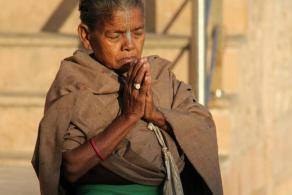The King’s Generosity
In the land of Andhra, a benevolent king regularly provided for two beggars, ensuring they had food and money. Each beggar had his own way of expressing gratitude: the older one would say, “God provides,” while the younger one would say, “Our king provides.”
A Test of Gratitude
One day, the king decided to test the older beggar’s gratitude. After giving them more than usual, the older beggar continued to praise God, which irritated the king. Determined to prove that he was the true benefactor, the king devised a plan to show the beggar who his real provider was.
The King’s Plan
The king instructed the beggars to take a different, less-traveled road, ensuring the younger beggar went first. He had secretly placed a purse of gold on this road, intending for the older beggar to find it. The younger beggar was meant to rely on divine providence.
The Missed Opportunity
As the younger beggar walked down the road, he thought the king’s choice of route was simply to enjoy the scenic view and, with eyes closed, he missed the purse of gold. The older beggar, following behind, eventually discovered the purse and claimed, “God provides.”
The King’s Second Test
The king then gave the younger beggar a hollowed-out pumpkin filled with silver coins, but the beggar, unaware of its contents, sold it to a merchant for a few coins. The next day, when questioned by the king, the younger beggar mentioned the few coins he earned from selling the pumpkin.
The Older Beggar’s Fortuitous Find
Meanwhile, the older beggar, who had received the pumpkin, found the hidden silver and attributed it to divine provision. He remained steadfast in his belief that “God provides,” even in this apparent test.
The Lesson
The king’s tests demonstrated the deeper truth that divine providence and human generosity are intertwined. The older beggar’s unwavering faith in God’s provision was reaffirmed by his fortunate discovery, while the younger beggar’s lack of knowledge about the true value of the pumpkin highlighted the king’s generosity.
The story illustrates that true provision comes from a blend of divine grace and human kindness. Both beggars received what they needed, showing that ultimate providence is a harmonious balance of both faith and human generosity.



